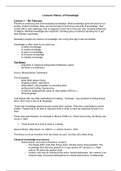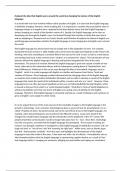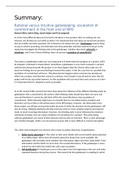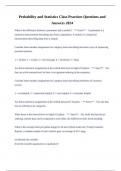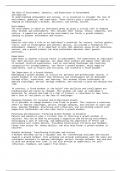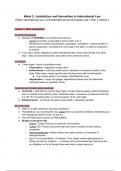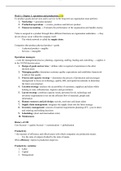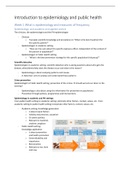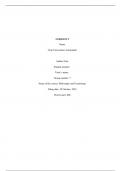Lecture 1 – 5th February
Process of producing and communicating knowledge. What knowledge gives structure to our
society. Impact increases. Now, we have access to enormous amounts of knowledge. That
comes with a new challenge: how to organize it and how to find your way. Growing influences
of religion. Medical knowledge also important. Growing group of parents deciding not to get
their children vaccinated.
Nowadays people say science is knowledge, but a long time ago it was humanities.
Knowledge is often seen as an active act
- to define knowledge
- to create knowledge
- to pass on knowledge
- to consume knowledge
- to validate knowledge
The library
- originated in Classical Antiquity/the Hellenistic culture
- but there is a prehistory
Excurs: Mesopotamia, Sumerians
The Sumerians
- 4000-3000 before Christ
- irrigating system, agriculture
- urbanization living together an providing food
- professional trading, bureaucracy
- cuneiform (spijkerschrift) script on clay tablets (3200 b.c.)
- fixing language
It all started with very little notifications for trading. “10 sheep”; very practical of writing things
down. But it was a way to fix language.
Script and knowledge passed across consecutive cultures. They also constructed a school
system. People had to be able to read and write in order to have an important function in a
town.
There were also libraries, for example in Nineve (7000 b.c). There lived a king, his library was
found in 1894.
There should be a kind of order in a library.
Second library: Ebla (Syria, ca. 2300 b.c.): archive found in 1974.
The library is not an invention from the Greek as such, but they did a likely thing.
Classical knowledge and science
- Oldest phase: oral culture (Homerus, Ionians)
o The Greek didn’t write their things down. Society led by strong leaders. The
knowledge they had was passed on in epic poems (8th century b.c.). Male
culture. All about the spoken word.
o Ionians: new way for looking at the world: natural philosophy the cosmos is an
ordered entity. Universal explanations for natural phenomena. Fundamental
, questions about the nature of things and changes. There must be a natural
cause instead of “the gods do this”. They started to question nature in this way.
There must be order and the universe must be made of small elements that
clash which cause movement. New, modern way of thinking. This knowledge
was still handed down from generation to generation.
- Classical era: the Greek city states (Athens)
o Sophists: exercising the spoken word, essential for the democratic process.
They started to write down school books and used fragments from the poets
from Homerus as examples of rhetoric. There started the written culture of the
Greeks.
o Counter movement: critical attitude of philosophers like Socrates and Plato:
they demanded for real, that is substantive knowledge (achieved in their
dialogs). They were rejecting the culture of written knowledge. Real knowledge
could only come to being in a dialogue. That is the only way to come to the
truth. As soon as a philosopher dies: his knowledge is gone problem.
o Aristotle: written knowledge because when Plato died, his knowledge was
gone. He started to write down everything he knew. He wrote very important
work on rhetoric and poetics. So within 3 generations, the philosophers
completely turned around. Aristotle had his own school: his lyceum. His
knowledge became easily transferable.
o “Real history starts”
- Hellenistic era (Alexander the Great): expansion, Alexandria
o Alexander conquered almost the entire world. After he died, the empire
collapsed and was divided. Among these different empires, the Greek culture
was passed on. There were several city’s with large libraries. Most important
library was founded in Egypt. The founding of the library of Alexandria was
extremely important, also containing a museum. This library became the
biggest library of the time. All the ships that came by Alexandria had to give
them books.
o Fixing and distributing knowledge
Science in the Hellenistic world
- In Egypt the most outstanding centre of knowledge: Alexandria
- Prolemaeus I, II and III
- Museion with a library organized by Demetrius of Pharlerus
- To fix, spread and amplify knowledge
- Scholars were attracted and facvored, striving for the ultimate and complete
knowledge of the world. Dynamicc culture with lots of different influences
- Septuagint = Greek translation of the old testament,
The Library of Alexandria
- striving for completeness
- fixing knowledge, uniforming texts, making texts transferable
- grouping texts in different knowledge areas
- opening up knowledge in catalogues and indexes
- new knowledge based on old texts by combining them
- cultural melting pot
- texts not preserved in a perdurable, lasting way
- role philosophy? Other disciplines took over
- Engine that made society more modern and competitive
- New: started to work as a kind of university, what is very important that it was a
completely open culture.
,In the mean time, in China…
- library as a vehicle to centralize the country and culture
- standardizing language
- reproducible texts
- main goal of the library: to fix and conserve the past (crucial difference with the library
in the western world)
- Chin dynasty took over power and build a new empire. They propagated a strong
unified culture. They wanted to have one language. All the books from institutions were
burned. Chin dynasty was succeeded by Han dynasty, they wanted to restore the lost
knowledge. One of the things they did is they wanted to bring Confuscius of the heart
of the Chinese world. They literally carved the writings of Confuscius in stone. The
focus in the Chinese culture was to the past. They used books and culture to preserve
instead of to develop new knowledge. This is completely different from what happened
in Alexandria! As a result, in China, a kind of closed, locked-in culture came into being
and that remained so for centuries. While the western world was driven by the urge of
new knowledge.
The expiration of the library of Alexandria? Many stories
- Julias Cesar who set fire to the library. made them aware of vulnerability
- By Muslims: all text were not useful so they could burn it
- By Christians: leader burnt down the library
- none of these stories are true
The library decays, but new centres of knowledge were founded. As a matter of fact, the
Romas as well as the Muslims and Christians did a lot to save and pass on knowledge and
texts.
A dynamic institute to compare knowledge and look for new applications.
It still is an important institution!
Lecture 2 – 7th February Classical knowledge in the Arab World
How was the library of Alexandria destroyed? Muslims, Romans or Christians. All these
groups have helped to preserve knowledge.
Painting of Rafael with Aristotle and Plato, made in the Renaissance, The school of Athens.
Averroes, medical doctor, he translated the work of Aristotle. He wanted to reconcile classical
Greek philosophy and the philosophy of Arab tradition.
Translation movement active in Baghdad: the Abbasid translation.
Arabic was important for the 12th century European renaissance.
The Abbasid Translation Movement
- various languages into Arabic
- middle of 8th until end of 10th century
- Baghdad
- Non-literary and non-historiographical texts, so exact sciences: biology, medicine,
astronomy, algebra etc.
, Why translate all the available scientific knowledge?
1. Friendly Christians: a small group of Syrian Christians was responsible for the
translation of the Greek scientific knowledge to Arabic. They were educated in Greek
and were living in a Arabic speaking environment. These Christians translated because
they thought it was important to do so. Keeping and sharing knowledge, preserving.
Most of the translators were in fact Syrian Christians, so this might be possible. The
Christian Syrians became a Christian minority in the middle east in the 8th century.
Before the start of the translation movement, these Syrians Christians were already
translating available knowledge from Greek to their first language. The translations
were already based on other translations from other languages.
- 4th - 5th century: dynamic translation (free but accurate)
- 6th century: literal or direct translation (word for word)
- 7th century: mirror or paraphrase translation
more about the persons than the movement
does this make us understand the scope and duration of the translation
movement
not only Syrian Christians were involved
2. Enlightened spirits: Abbasid translation movement was possible because of small elite
of enlightened individuals 8th century Baghdad. House of wisdom: meeting places for
scholars, small scale academies in the Abbasid empire to share knowledge. Became
popular in 8th century Baghdad, very isolated and elitist. These small elite individuals
were probably active there.
Eurocentric and a-historical
scope and duration are again not really understood
people were religious
you cant explain the movement through secular/enlightened framework or
renaissance. Unfair way of comparing very different societies and times and parts of
the world.
3. Social phenomenon (Gutas): lasted more than two centuries, was supported by all of
the local elite, was financed by the rulers, was executed in systematic way, the result
of an ideology. It wasn’t isolated. It was at the core of the Abbasid empire. Gutas
claims that the movement was a result of an ideology: Abbasid ideology.
- scope and duration (Gutas): Sassanid ideology, society under Abbasid rule in dire
need of knowledge (and translations of that knowledge). Dialogue between
religions, discussions within religious groups, administration, law, economy,
medicine, engineering.
- Part of an ideology in order to gain power and a stable society
1+2 more about the scholars who came up with these thesis than about the real movement.
Abbasid Ideology
7th century. 632: beginning of Islamic era. Byzantium empire becomes isolated and enters a
dark age. At that time translation and science is flourishing. The Arab world becomes a contact
zone, different cultures and religions start to interact.
Umayyads (661-750)
- centre: Damascus
- maintain structure of Greek (Byzantine) administration
- little interest in (secular) Greek science
- feudal empire ruled by Arab tribes
- unrest Abbasid uprising which will end Umayyad rule. Why did they compete?
Suni vs. ??? Abbasid moved the centre (Damascus) to Baghdad.
Abbasid Heydey (750-950)
- Baghdad becomes center of power and culture

